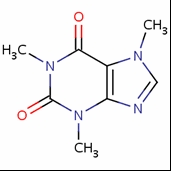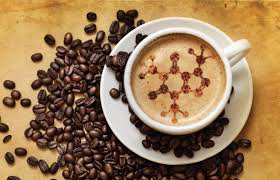

Caffeine is the world's most popular stimulant—the drug that four out of five Americans take on any given day. Most of the caffeine we consume comes from coffee.

The United States buys nearly one-half of the world's supply of coffee beans. It is said that a food service operation can stand or fall on its reputation of the coffee it serves. Every mid-morning and mid-afternoon working day millions of office and factory workers abandon jobs for an employer-paid "coffee break."
Over 15 million Americans are hooked on coffee, and most of them don't even know it, so insidious is its addictive onslaught. The child or adult may unknowingly ingest several hundred milligrams of caffeine daily.
Like narcotics, alcohol, or cigarettes, coffee and caffeinated beverages are addictive, destructive drugs that each year predispose millions of Americans to crippling illnesses and sometimes fatal diseases.
Coffee and tea are the two most popular beverages in America. Coffee is America's number one drug problem.
Caffeine Withdrawal
Caffeine withdrawal can occur from missing just one cup of coffee in the morning. Symptoms of caffeine withdrawal are headaches, irritability, inability to work effectively, nervousness, restlessness, and lethargy. A steady user of caffeine may, at times, experience tight headaches in the back of the neck area and be quick to anger or irritation.
Caffeine Acts as a Stimulant
Caffeine is a toxic stimulant. This is not natural for the body. It activates the "fight or flight" response.
It's important to remember that the caffeine in coffee is a powerful substance. It can stimulate the central nervous system, increase heartbeat and metabolic rate, increase the secretion of stomach acid, and step up kidney and bladder action. It's also well known for its annoying ability to affect sleep.i
The article goes on to say that in higher doses, caffeine can cause "coffee nerves"—a wide assortment of symptoms including anxiety, irritability, headaches, light-headedness, nausea, and diarrhea.ii
Coffee can cause a temporary increase in blood sugar, but it is quickly followed by a decrease, and stimulates the release of adrenaline, which causes body tissues to be broken down into sugar and fat. Too much insulin is produced, and the blood sugar falls to a low level.
Caffeine is a Poison
Caffeine, which is the main chemical in coffee, is a powerful poison! A drop of caffeine injected into the skin of an animal will produce death within a few minutes. An infinitely small amount injected into the brain will cause convulsions. The amount of caffeine in a cup of coffee is quite small, yet we drink coffee because of the effect of the caffeine, just as we smoke because of the effect of the nicotine. Both are drugs, and both are habit-forming. Both are poisons.
Coffee Drinking and Stomach Ulcers
The general public usually associates ulcers and heart trouble with coffee drinking. J.A. Roth and A.C. Ivy, whose experiments on coffee are famous, state this:
Caffeine produces gastro-duodenal ulcers in animals to whom the drug is given in a beeswax container so that their stomachs are absorbing caffeine continually. Also, caffeine produces very definite changes in the blood vessels of animals, which are similar to changes produced by prolonged resentment hostility and anxiety.iii
Coffee Linked to Hip Fractures
"People who drink more than two cups of coffee or four cups of tea a day could be increasing their risk of hip fracture in old age, according to a new study."ivThe study, published in the October issue of the American Journal of Epidemiology, is the first to link caffeine consumption with hip fractures that occur in older people whose bones have weakened. A hip fracture often marks an elderly person's final decline into dependency or death.
Brown University's Dr. Douglas P. Kiel and his colleagues looked at how much coffee or tea 3170 people reported drinking over 14 years. They then looked to see which ones fractured their hips, a sign that bones had become brittle. They found that heavy caffeine drinkers were 53% more likely to suffer hip fractures.
Infertility
Trying to become pregnant? Stop drinking caffeinated drinks. Among 104 women, those who drank just one cup of caffeinated coffee a day were half as likely to become pregnant during any given menstrual cycle as those who drank less, according to a 1988 study by Allen Wilcox of the National Institute of Environmental Health Sciences.
Most of the studies conducted since then have also found that caffeine impairs fertility, but usually only at three or more cups of regular coffee a day.
But the research is only as good or bad as the women's memories. For example, scientists at John Hopkins University found that among 2500 women who were trying to become pregnant, consuming more than 300 mg of caffeine a day reduced their chances of succeeding in any given month by 17%. But those results were based on the amount of coffee and soft drinks the women could remember having consumed as many as ten years earlier.
Even so, "it's probably prudent for women who are trying to become pregnant, and especially for those having trouble, to cut back on caffeine," says Mark Klebanoff of the National Institute of Child Health and Human Development in Bethesda, Maryland.
Does Coffee Cause Cancer?
There is mounting evidence suggesting that if you want to avoid certain cancers, you are well-advised to kick the coffee habit. Consider these examples:
One study revealed that not only was coffee drinking associated with increased risk of bladder cancer, but the drinking of non-diet cola drinks also was linked to this problem.
Coffee drinking increases the risk of birth defects.
Coffee drinking increases blood pressure, increasing the risk of heart disease.
It is commonly thought that the drinking of coffee, soft drinks, and other caffeinated drinks is a minor matter as far as our health is concerned. But is it? We cannot estimate its effect on mind and emotions, discrimination, and judgment. And then there are the harmful effects of the stimulation on the heart and other vital organs.
Coffee and other caffeinated beverages are poor substitutes for water. The body need fluids, but not stimulating drugs. Giving up the coffee habit is relatively easy to do for most folks—once a commitment has been made. Since caffeine is a less toxic drug than alcohol or street drugs, the majority of coffee drinkers can give up the habit without the sort of difficulties that alcoholics and drug addicts typically experience.
When giving up caffeine, eat and drink only what contributes in some way to good nutrition for the body. Any food or drink does not contain vitamins, minerals, or enzymes should automatically be crossed off the list. While breaking the coffee habit, be sure to drink plenty of fresh juices and water.
Just how widespread is coffee drinking? The average American drinks over twenty-six gallons of coffee per year, but perhaps more germane to the discussion is caffeine itself. Coffee has over three hundred chemicals; caffeine is only one of them.v
Updated January 2009. If you enjoyed this article, share it with a friend. Also, check out our media site—Amazing DiscoveriesTM TV.
For more information, check out these references:
Charles F. Wetherall, Kicking The Coffee Habit, Wetherall Publ. Co. MN.
Andrew Weil, MD & Winifred Rosen, Chocolate To Morphine, Houghton Mifflin Co., Boston, Mass.
Mervyn G. Hardinge, MD, A Philosophy of Health, Loma Linda University, CA.